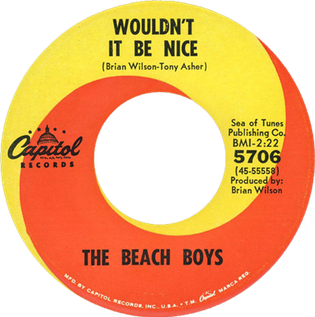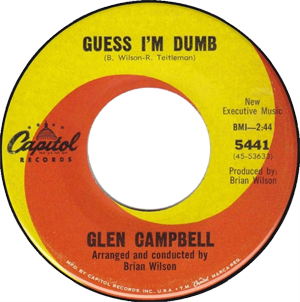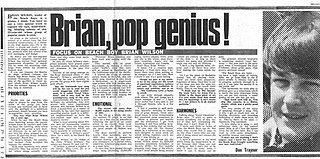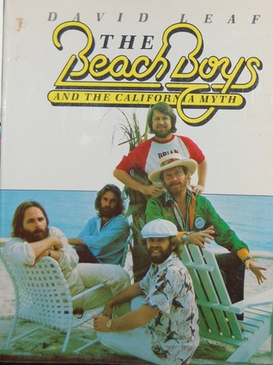
Brian Douglas Wilson is an American musician, singer, songwriter, and record producer who co-founded the Beach Boys. Often called a genius for his novel approaches to pop composition, extraordinary musical aptitude, and mastery of recording techniques, he is widely acknowledged as one of the most innovative and significant songwriters of the 20th century. His best-known work is distinguished for its high production values, complex harmonies and orchestrations, layered vocals, and introspective or ingenuous themes. Wilson is also known for his formerly high-ranged singing and for his lifelong struggles with mental illness.

The Beach Boys Today! is the eighth studio album by the American rock band the Beach Boys, released March 8, 1965, by Capitol Records. It signaled a departure from their previous records with its orchestral sound, intimate subject matter, and abandonment of car or surf songs. Side one features an uptempo sound, while side two consists mostly of introspective ballads. Supported by this thematic approach, the record became an early example of a rock concept album and established the group as album artists rather than just a singles band. It has since become regarded as one of the greatest albums of all time.
Anthony D. Asher is an American songwriter and advertising copywriter who is best known for his collaborations with Brian Wilson and Roger Nichols in the 1960s. Asher co-wrote eight songs on the Beach Boys' 1966 album Pet Sounds, including the singles "God Only Knows", "Wouldn't It Be Nice", and "Caroline, No". According to Asher, he mainly served as a lyricist for Wilson's songs, but in some cases also contributed musical ideas. Asher also composed jingles, such as Mattel's slogan "You can tell it's Mattel—it's swell!", and contributed songs to The Partridge Family.

"Wouldn't It Be Nice" is a song by the American rock band the Beach Boys and the opening track from their 1966 album Pet Sounds. Written by Brian Wilson, Tony Asher, and Mike Love, it is distinguished for its sophisticated Wall of Sound-style arrangement and refined vocal performances, and is regarded among the band's finest songs. With its juxtaposition of joyous-sounding music and melancholic lyrics, it is considered a formative work of power pop, and with respect to musical innovation, progressive pop.
"I Know There's an Answer" is a song by American rock band the Beach Boys from their 1966 album Pet Sounds. Written by Brian Wilson, Terry Sachen, and Mike Love, the song was inspired by Wilson's experience with the drug LSD and his struggle with ego death. Musically, it is distinguished for its colorful arrangement, unorthodox structure, and bass harmonica solo. The instrumentation also includes guitars, tambourine, tack piano, banjo, clarinets, flutes, electric keyboards, and timpani. Wilson, Love, and Al Jardine trade the lead vocal, for which the melody spans two octaves.
"You Still Believe in Me" is a song by American rock band the Beach Boys from their 1966 album Pet Sounds. Initially conceived as "In My Childhood", it was the first songwriting collaboration between Brian Wilson, the group's de facto leader, and songwriter Tony Asher. Wilson sang the lead vocal.

"Caroline, No" is a song by American musician Brian Wilson that was released as his first solo record on March 7, 1966 and, two months later, reissued as the closing track on the Beach Boys' album Pet Sounds. Written with Tony Asher, the lyrics describe a disillusioned man who reflects on his former love interest and the loss of her innocence. Musically, it is distinguished for its jazz chords and unusual combination of instruments, including bass flutes, 12-string electric guitar, and muted harpsichord.

Marilyn Wilson-Rutherford is an American singer who is best known as the first wife of Beach Boys co-founder Brian Wilson. She was also a member of two girl groups, the Honeys in the 1960s and American Spring in the 1970s.
"Girls on the Beach" is a song by the American rock band the Beach Boys from their 1964 album All Summer Long. Written by Brian Wilson and Mike Love, the song is in the vein of the band's previous surf ballads and features Four Freshmen-inspired harmonies. The song also served as the title track to the movie The Girls on the Beach.
"Don't Hurt My Little Sister" is a song by the American rock band the Beach Boys from their 1965 album The Beach Boys Today!. Written by Brian Wilson with additional lyrics by Mike Love, it was inspired by Wilson's interactions with sisters Marilyn, Diane, and Barbara Rovell. It was produced on June 22, 1964, making it the earliest-recorded song on the album.
"In the Back of My Mind" is a song by American rock band the Beach Boys from their 1965 album The Beach Boys Today!. Written by Brian Wilson and Mike Love, it is a heavily orchestrated ballad composed in 6/8 time. Dennis Wilson largely sings lead solo though briefly during the middle eight, his brothers Brian and Carl sing two lines in unison.
"The Warmth of the Sun" is a song written by Brian Wilson and Mike Love for the American rock band the Beach Boys. It was released on their 1964 album Shut Down Volume 2 and as the B-side of the "Dance, Dance, Dance" single, which charted at number eight in the United States and number twenty four in the United Kingdom. Brian Wilson produced the song, and the rest of the album.
"Johnny Carson" is a song by American rock band the Beach Boys from their 1977 album The Beach Boys Love You. It was written by Brian Wilson as a tribute to one of his idols, Johnny Carson. The recording features Mike Love on lead vocals, accompanied by an arrangement of synthesizers, organ, and piano.

Sweet Insanity is an unofficial album by American musician Brian Wilson that was produced in 1990 as the follow-up to his first solo album, Brian Wilson (1988). It was largely written and produced by Wilson alongside his former psychologist, Eugene Landy.

"Guess I'm Dumb" is a song recorded by American singer Glen Campbell that was released as his seventh single on Capitol Records on June 7, 1965. Written by Brian Wilson and Russ Titelman, it is a love song that describes a man who regrets ending a relationship after he realizes he still harbors deep feelings for his former lover. The single failed to chart.

Wouldn't It Be Nice: My Own Story is the first memoir by American musician Brian Wilson, written with celebrity journalist Todd Gold and published by HarperCollins in 1991. The book was heavily criticized for the implausibility of Wilson being its actual author, and it inspired multiple defamation lawsuits from his family members and associates.

Good Vibrations: My Life as a Beach Boy is an autobiographical memoir by American musician Mike Love, co-founder of the Beach Boys, written with James S. Hirsch. The book was published by Blue Rider Press on September 13, 2016, one month before the release of fellow co-founder Brian Wilson's autobiography, I Am Brian Wilson: A Memoir. Love wrote the book as a response to "many inaccuracies" that had been said about him over the decades. Much of it covers his 1992 lawsuit against Wilson for owed songwriting credits.

"Brian Wilson is a genius" is a line that became part of a media campaign spearheaded in 1966 by the Beatles' former press officer Derek Taylor, who was then employed as the Beach Boys' publicist. Although there are earlier documented expressions of the statement, Taylor frequently called Brian Wilson a "genius" as part of an effort to rebrand the Beach Boys and legitimize Wilson as a serious artist on par with the Beatles and Bob Dylan.

Mount Vernon and Fairway is an EP by the American rock band the Beach Boys that was included as a bonus record with their 1973 release Holland. It is a 12-minute musical fairy tale, primarily composed by Brian Wilson, assembled by Carl Wilson, and narrated by manager Jack Rieley. Brian provided the voice of the Pied Piper and drew the sleeve cover.

The Beach Boys and the California Myth is a 1978 biography of the Beach Boys that was written by American author David Leaf, editor and creator of the Pet Sounds fanzine. It was the first full-length book written about the band and an early piece of writing that revealed much of their internal conflicts and family history.













